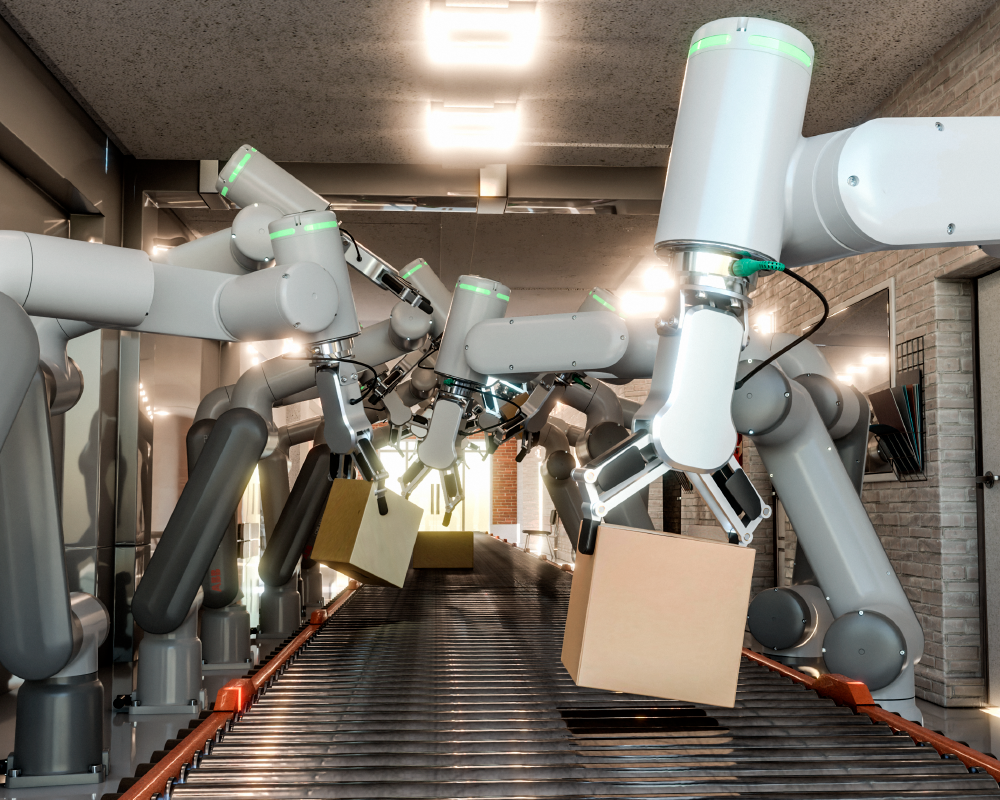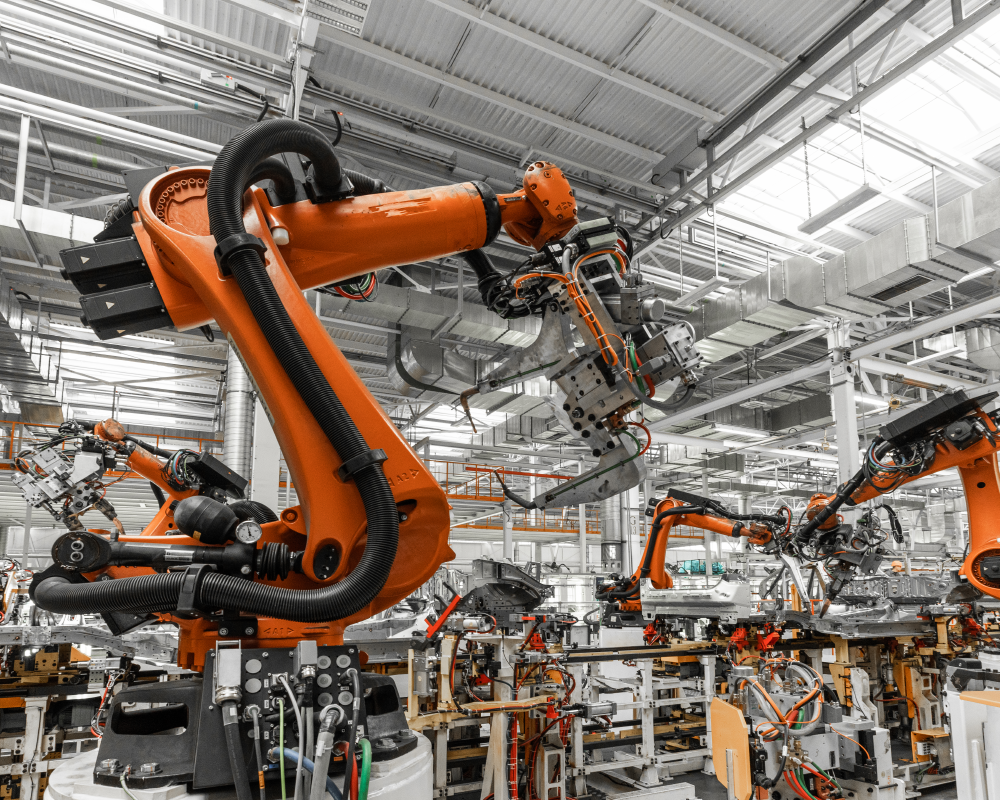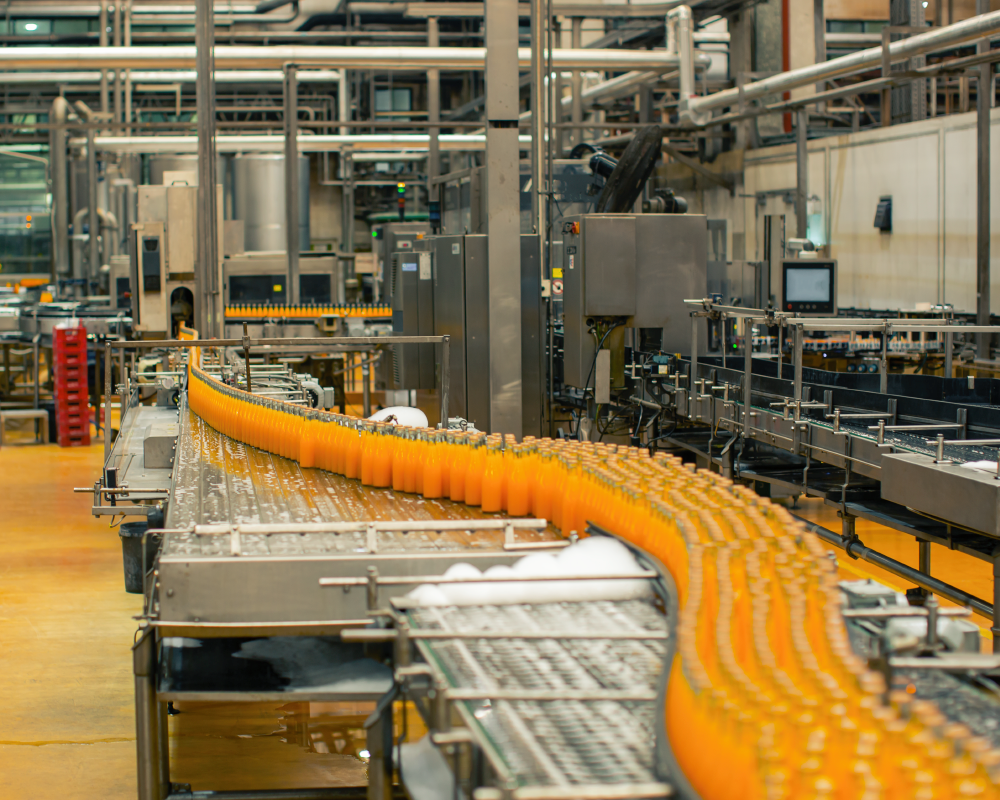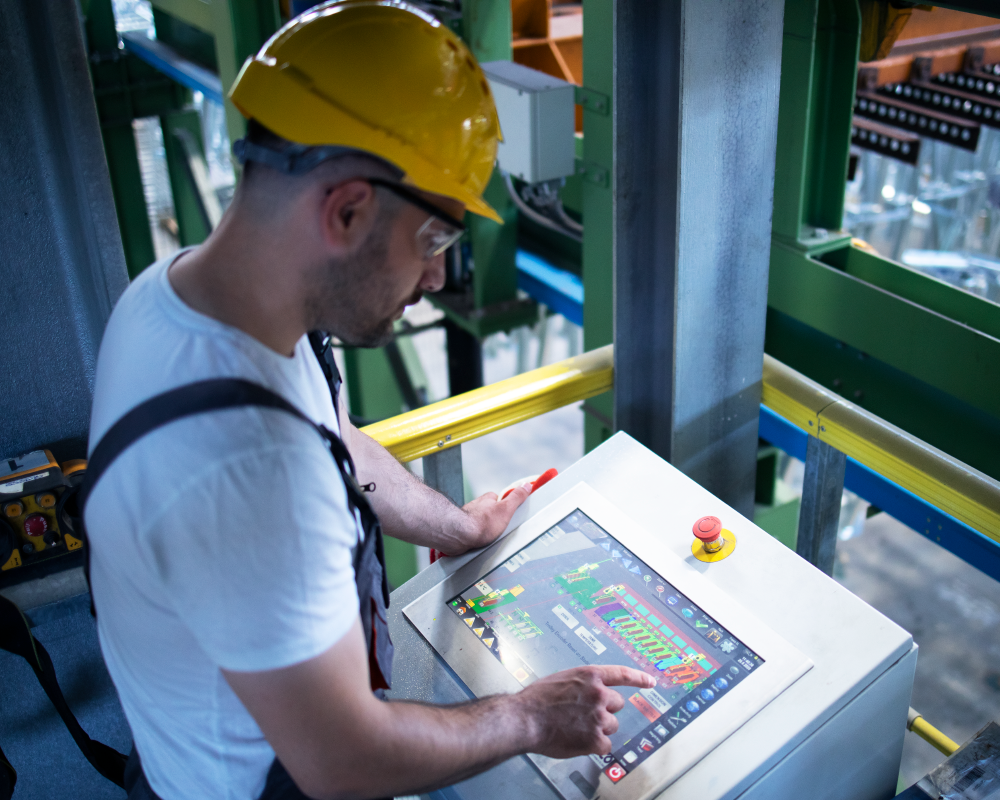In an era of rapidly increasing pressure for cost efficiency in industry, automatic production lines are becoming a key element of technological transformation in the field of goods manufacturing.
There are many benefits to implementing automation into production processes. Increased productivity, reduced costs, and flexibility to respond to changing market conditions are just some of them. However, implementing new automatic production lines poses several challenges. What considerations do companies planning to automate production need to take into account? How are Industry 4.0 principles related to production lines? What does the process of designing and implementing these lines entail? These and other questions will be answered in the following article by Paweł Małachowski – Senior Design Engineer at Endego.
The driving force behind the dynamic technological development we are currently experiencing is the idea of Industry 4.0. The implementation of automated production lines is perfectly in line with this revolutionary concept. The use of robots, digitisation, automation, and the systematic collection of data are influencing the innovation of production lines, enabling more efficient, precise, and flexible working.
Here are the key elements of the Industry 4.0 concept that impact modern production line design and optimisation:
Robotics: Industrial robots equipped with sensors and programmable arms are able to perform a variety of tasks that previously had to be performed by humans: from assembly to packaging and sorting.
Artificial Intelligence: Advanced AI algorithms make it possible to monitor, analyse, and optimise production processes. AI systems can also predict failures and prevent interruptions in production.
Internet of Things: IoT devices allow remote monitoring and management of production lines. This makes it possible to react quickly to potential problems and optimise productivity.
Data storage: Data collected from production lines allows areas for optimisation to be identified.
Companies are constantly looking for ways to improve the efficiency of their production processes. One of the key tools to achieve this is the automation of production lines. The advantages that automation brings to manufacturing are primarily:
One of the most important advantages of automatic production lines is the increased productivity and speed of production. Automated processes allow tasks to be performed faster and more reliably, leading to increased production rates. Robots and machines operate continuously, eliminating interruptions caused by human fatigue. In addition, automated production lines are designed to provide a specific time to produce the finished product. This results in faster delivery of goods to the market, which in turn can affect competitive advantage.

Automatization eliminates human mistakes and reduces deviations in production processes. As a result, products are manufactured with more precision, resulting in higher quality products. Complex and repetitive tasks, prone to human errors, can now be executed with precision by advanced production lines. The automation of production processes eliminates the risk of errors due to human factors, such as mistakes, fatigue, or lack of employee focus. Automatic systems operate according to pre-programmed algorithms, which minimises the likelihood of errors.

Automatization helps reduce production costs. Although investing in automatic production lines can be costly initially, it saves money in the long term. Following the initial investment, automated machines yield lower costs compared to human labour performing the same tasks. In addition, the optimisation of production processes and the minimisation of errors translate into reduced costs associated with defective products and reduced material losses.
The COVID-19 pandemic is a prime example of how sudden events can affect the operation of businesses. Automatic production lines, largely independent of human intervention, can continue production even when workers are forced to remain isolated.
Modern production lines are characterised by flexibility, allowing production to change quickly from one type of product to another. This is an important feature in an environment where market trends and customer demand can change rapidly. With flexible production lines, companies can adapt to new requirements without major production interruptions or wasted resources.
Production lines equipped with Industry 4.0 technologies enable monitoring and remote control of production processes. The real-time data collected on them can be analysed, allowing potential failures to be detected early and corrective action to be taken before major problems occur.

The introduction of automatic production lines brings significant benefits, but also comes with some challenges that companies need to address.
One of the main challenges is the need to invest in machinery and technology to enable automated production. Each new type of product may require adaptation or even the purchase of completely new equipment. This comes at a financial cost as well as the time required to implement new technological solutions.
Automatic production lines require new skills from personnel. Employees need to be trained in their use and in managing automated processes.
The introduction of automatic production lines often involves the integration of different systems and technologies. This is a complex process that requires cooperation between different departments of the company.
Automated systems require constant monitoring and maintenance. Keeping the equipment in good working order and responding quickly to any failures are key to maintaining production continuity.
Endego has the knowledge and experience to design production lines for a diverse range of industries. Whether your company is in the automotive, white goods, construction, or other fields, Endego is able to tailor solutions to the specific requirements and needs of your sector. There are many ways in which Endego can support your company in the introduction of automatic production lines, including:
When your company wants to automate production, Endego presents the most cost-effective and efficient solutions. Based on an analysis of the company’s operations, Endego prepares a design and quotation, enabling planning and budgeting based on reliable data.
Using advanced 3D Design tools such as Catia and SolidWorks, our engineers create a detailed design and visualisation of the production lines as well as their technical documentation. Endego has implemented a precisely designed, multi-stage production line design process. Each of its stages aims to ensure that the line is perfectly functional and efficient, and to meet customer expectations by guaranteeing efficient production.
The first stage, the order analysis, is the foundation of the entire process. The priority is to design a line that meets specific requirements, such as CT (‘Cycle Time’) or OEE (machine utilisation rate), etc.
The concept is the second step and is based on the analysis of the order. Here, engineers create various variants of the solution, taking into account technical aspects, ergonomics, and efficiency. In this way, a first framework design is created that will potentially meet the customer’s requirements.
In the next stage, engineers proceed to the detailed design of the production line and the selection of mechanical, electrical, and pneumatic components. Aided by advanced tools such as Catia and SolidWorks, designers create three-dimensional models (Design 3D) to see the line simulated in space. In the machine design and construction phase, our engineers draw on their extensive knowledge and many years of experience. It is at this stage that innovative ideas are born that shape the heart of machines. The result is the creation of production lines that are not only functional but also distinguished by their unique character and innovative potential.
Once the line has been carefully designed, the ordering of components proceeds. The parts are completed and assembled. Although we do not have our own assembly department, we work with reputable external companies that carry out assembly based on Endego’s design and under our supervision. This partnership enables comprehensive project implementation, ensuring high-quality assembly according to design.
The production line is usually installed and pre-started at our department in Gliwice. This is the stage when the equipment is connected and its correct functioning is checked.
After pre-commissioning, test production is carried out to check that the process meets all requirements. Possible imperfections and areas for optimisation are identified and rectified.
If the tests have been successful, the line is transported to the customer’s site. The assembly of equipment, optimization, and on-site commissioning then take place in accordance with the previous assumptions.
The final stage is to carry out operator training. Endego’s specialists teach the customer’s employees how to use the new production line, ensuring that the technology is used effectively.
Endego provides a guarantee on its machines that also includes maintenance of the line throughout, and a fast response to warranty claims is one of the hallmarks of our company.

Automatic production lines bring many benefits but also pose some challenges for companies. Capital expenditure, the need to train employees, and the integration of technology are all factors that need to be taken into account when planning an implementation.
Endego is a partner that can help your company introduce automatic production lines, regardless of the industry you work in. We offer support from the beginning to the end of the process, from conception and design to implementation, line commissioning, warranty, and post-warranty service. Thanks to the professionalism, experience, and knowledge of Endego’s employees, the creation of production lines is a standardised process leading to the delivery of advanced and optimised solutions meeting the highest standards to the customer.
If you would like to learn more about automatic production lines, contact us today.
If you think about car… is it complicated? Chassy, wheels, engine, gearbox, stereo, air condition and you’re good to go. Well, cars are not so simple anymore. Automotive business evolved, and cars are no longer only about driving, it’s about how you spend you’re time during driving and of course – safety.
Read moreThe future of rail transport is inextricably linked to environmentally friendly technologies. According to many experts, hydrogen trains are to become one of the cornerstones of modern railways. How do Polish companies fare in terms of the advancement of work on the application of hydrogen in the railways? Can hydrogen trains revolutionise rail transport in our country and around the world?
Read moreThe idea of sustainability and a focus on ecology determine the direction in which modern public transport is heading. The hydrogen bus is an innovative means of transport that fits perfectly into the standards that modern public transport should meet. On the streets of Polish and foreign cities, it is increasingly common to see these low-emission vehicles, which not only quickly become a functional element of public transport, but also provide a range of benefits in other areas, including contributing to improved air quality in the locality. Along with their electric counterparts, hydrogen buses are expected to become an integral part of the urban landscape within the next few years. What makes such high hopes for them?
Read more